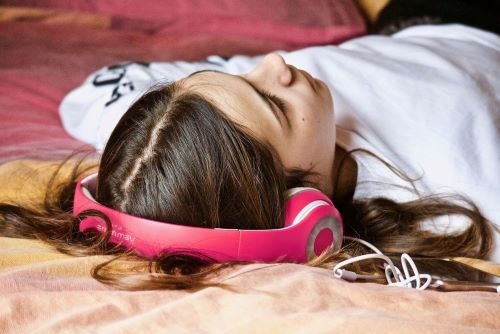Music can have a significant impact on your mood and how you feel, but can it improve your health? Using music for healing dates back to ancient history and even mythology, such as the Greek Orpheus ‘soothing savage beasts’ with his lyre.
The calming influence of music can indeed affect stress levels, something the modern world has in abundance! Popular meditation practices (like Transcendental Meditation, Yoga and Reiki) all use relaxing music to enhance their effects by relaxing the body and the mind which helps release Endorphins, such as Serotonin and Dopamine.
In the sixties, Beatle George Harrison’s comment on Transcendental Meditation said it all: “We have all the money you could ever dream of. We have all the fame you could ever wish for. But, it isn’t love. It isn’t health. It isn’t peace inside, is it?” In this article, we’ll look at how anyone can achieve ‘healthy inner-peace’ through music!
Table of Contents
What are the benefits of music?
Most people would agree that listening to their favourite music can help relieve the tensions of an increasingly chaotic world. Music’s power to soothe the ‘savage beasts’ of everyday life provides a variety of useful health benefits:
1. Stress and Anxiety Relief
It is generally believed that stress causes 60% of all our diseases and illnesses, and it has been shown that music helps decrease levels of a hormone called cortisol. This is the body’s primary stress hormone, released to help the body deal with whatever it is that is causing the stress. While cortisol can be helpful for exercise and optimum blood flow (see ‘Exercise’ below), it can cause unwanted side effects like anxiety.
A recent study showed people who regularly listened to relaxing music were able to recover more quickly from stressful situations than people who didn’t. Interestingly, people who listened to nature sounds showed a similar response.
2. Helping People Exercise

Thousands of years ago, stress would have been a daily necessity for survival. The adrenaline and cortisol released primes the body for ‘flight or fight’, with a faster heart rate pumping oxygen-rich blood to the muscles.
A study at London’s Brunel University School of Sport and Education found that listening to up-tempo music whilst exercising, especially when performed in time, can greatly increase endurance by as much as 15%. Most of the test subjects also reported an increased level of enjoyment and positive motivation, even when close to exhaustion.
3. Helping With Memory and Concentration
Everyone is familiar with the image of students listening to music whilst studying or the pop charts playing from a radio in a busy workplace. Music is a very useful tool in this type of situation. It is thought to occupy the unconscious mind, leading to fewer distractions, something the unconscious mind is very good at!
The type of music may also be important and would vary depending on the situation. Classical or ‘chill-out’ music would suit a sedentary occupation, whereas upbeat pop music seems to help people doing more physical work.
4. Helping With Dementia

Another advantage of using music to aid memory suggests that it may alleviate symptoms of dementia. Research has shown that music can help reduce the distressing symptoms of dementia, such as agitation, apathy and anxiety.
Some sufferers, who rarely spoke, started singing along to songs they had heard before. Some even got up and danced. People living with dementia find it hard to communicate with others, but the shared experience of music and certain songs can facilitate a connection that goes beyond words.
5. Coping With Pain
Music can actually help reduce pain by taking the focus away from it. It activates sensory pathways that compete with pain pathways in the brain, stimulating emotional responses, and engaging cognitive attention.
In a study, researchers from the University of Utah Pain Research Center explored the benefits of music for reducing pain in people with high levels of anxiety. They discovered that music could be a useful distraction from some types of pain, such as toothache or headaches.
6. Helping With Sleep

Relaxing music can reach your subconscious mind and stimulate the release of sleep-friendly hormones, including serotonin and oxytocin, whilst reducing sleep-blocking hormones like cortisol. Many people these days drift peacefully off to sleep listening to the radio or their iPods, the choice of music varying, depending upon generation. My partner (a Reiki Master) has been known to nod off in a busy room (even the occasional party) if Reiki music is playing! The music can prevent your mind from engaging in negative thinking on life’s problems with the focus solely centred on the present and on relaxing, therefore promoting restful sleep.
7. Elevating Mood
Studies have found that music can put people in a better mood. Listening to upbeat music whenever you feel sad fosters the release of serotonin, a hormone that is known to give a general sense of well-being.
Songs with positive messages or inspirational meanings can give you the strength and motivation to carry on, even if you feel like giving up! It’s no coincidence that songs such as national treasure, Vera Lynn’s ‘We’ll meet again” boosted the national mood during world war two and the annual Christmas number one (I mean Slade’s ‘Merry Xmas’, obviously!) gets everyone (including granny) up and dancing!
8. Relieve Symptoms of Depression

Research also suggests the kind of music listened to can have remarkable effects on depression: Classical and meditative music, feelgood pop songs and dance music were found to be particularly uplifting and helped people feel much better about life. I personally have a few playlists on my phone specifically for lifting me out of a ‘funk’ and avoiding the ‘Abyss’!
A review of the evidence recently concluded that when music was used alongside treatments such as therapy the results are usually better than the treatment alone. However, they pointed out that compared to each other, talking to your doctor and engaging with the therapies available is likely to be more effective than music.
Can music have negative effects?
In medieval times the Catholic church banned musical intervals known as ‘The Devil’s Tritone‘. The dissonant harmonics were thought to produce ‘satanic’ vibes and cause bodily, as well as mental, illness. Holst used them to chilling effect in Mars, from the Planets suite, and bands like Black Sabbath have used them to create whole albums of slightly disturbing music.
Such music has frequently been linked to various cults and even murder. Charles Manson was said to have been heavily influenced by The Beatles psychedelic music. During the Vietnam War, US helicopter pilots blasted loud rock ‘n’ roll to disorientate the enemy and cause fear and anxiety.
Is Some Music Better for Your Health Than Others?
Meditation techniques like Reiki use quiet, low key music very effectively to relax the whole mind and body:
A form of music utilising a technology called binaural beats can help quiet your mind quickly by inducing the kind of brainwave states experienced during meditation. It is thought that some of the most relaxing mimic the sounds babies hear/feel in the mother’s womb.
Some frequencies are thought to resonate better with nature, such as the Solfeggio frequency, which is 432 Hz, understood to be a superior tuning to the modern music standard of 440 Hz.
How Long Do I Need to Listen to Experience Health Benefits?
There is really no set amount of time, but in most cases the longer you can relax, the higher the benefit.
Researchers comparing the effects of classical music on normal, healthy subjects for 15 minutes, reported a reduction in tension. After 30 minutes, the stress hormone cortisol significantly dropped in the research subjects. Daily exposure of at least half an hour would therefore have a cumulative effect on mind and body, positively affecting long term health.
Conclusion
So, as we can see, music can be both a powerful tool for good and bad! Relief from stress and anxiety is something everyone could benefit from, as can be seen from scientific research. Coupled with exercise, the health benefits are plainly obvious.
The psychological effects also appear to be numerous, with improved memory being a major plus for the student and the elderly sufferer of dementia. The soothing quality of music, acting to enhance pain relief and improved quality of sleep, suggests a depth to music as more than just a pastime!
So whether you’re feeling blue, going for a run, visiting grandad or settling down for a quiet night in, play your favourite tracks in the background. Try to avoid the heavy metal though!
My Supplement Recommendations
These are products that I currently use and enthusiastically recommend:
Multivitamin – Nutrigenesis Multi for Men or Nutrigenesis for Women. Performance Lab use their patented Nutrigenesis technique to provide a range of vitamins and minerals in their most effective form. Read my review.
Nootropic – Mind Lab Pro contains eleven natural nootropics that have been proven to support cognitive function and brain health. Read my review.
Collagen – Edible Health Bovine Collagen. This excellent bovine collagen powder is completely tasteless and absorbs quickly into any liquid. It’s third-party lab tested and provides 13g of collagen per serving. Read my review.
Turmeric – VitaBright Organic Turmeric with Ginger and Black Pepper. These turmeric capsules are organic, effective and affordable. They include black pepper to enhance curcumin absorption and ginger to provide additional useful benefits. Read my review.
Incredible value – G&G Vitamin 28 day packs This is the most affordable way to buy supplements in the UK. One tub holds 28 daily packs of up to 11 different vitamins, minerals or food supplements.
Further reading: You may also be interested to read 7 Top Tips for a Better Night’s Sleep and Which Supplments Should I Take? If you’re looking for great natural supplements, try Best Turmeric Supplements UK, or Best Multivitamins UK.
This site is a participant in affiliate advertising programs designed to provide a means for sites to earn advertising fees by advertising and linking to products and services. We participate in programs from Amazon, eBay, CJ, Awin, Viglink and other sites. We are compensated for referring traffic and business to companies linked to on this site.

